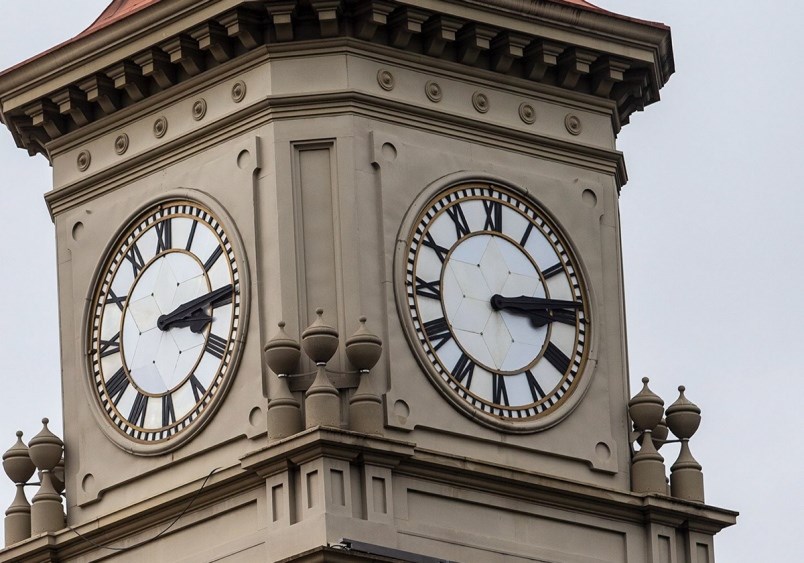A commentary by a former Times Colonist columnist.
With summer a distant memory and days at their shortest, here’s an experiment you might want to try. Before you go to bed, turn your clocks ahead one hour, to daylight time, which is what our provincial government is planning to impose upon us year round, despite proven health and safety risks.
If you live in Victoria, the sun won’t rise until after 9 the next morning — around 9:30 if you’re in Prince George, and after 11 if your home is in Fort Nelson.
When school resumes in the new year, no matter where you are in B.C., your children or grandchildren will be travelling to school in pitch blackness, increasing their risk of being hurt or even killed on the road.
Let’s assume, however, that they arrive safely. They’ll have had less sleep, be less alert and less able to learn. If the goal of government is to bolster the economy by switching to daylight time, as it claims, they’ll need to factor in the educational dollars wasted on somnolent students.
Meanwhile, those students’ risks of ending up with diabetes, depression, cancer, obesity and heart attacks will be higher, as will those risks for the rest of us. Back to the economy, that whooshing sound you hear is B.C.’s health care costs climbing unnecessarily.
Researchers in B.C. and around the world who study sleep and biological rhythms agree that permanent daylight time harms public health and safety. By all means, they say, abandon the aggravating and dangerous “spring forward fall back” exercise.
But, they say, please stick with standard time, which clicks with our bodies’ internal clocks, and sets us up for better sleep and better health.
How do scientists know standard time is superior to daylight time? Unwittingly, we’ve all been part of a natural experiment that has been cleverly harnessed to shed light on this question.
It’s based on time zones. B.C. is one zone, but those living at the eastern edge see the sun an hour earlier than those of us on the West Coast, because it takes daylight that hour to traverse our province.
So what? According to the Canadian Society for Chronobiology, published in the Globe and Mail: “Analysis of health data from millions of people shows that people on the western edges of time zones get about 19 minutes less sleep every night than people on the east, and also have significantly higher rates of obesity, diabetes and heart attacks than people on the eastern edges. Even scarier, cancer rates significantly increase when the sunrise is later on the western edges. Permanent [daylight time] would make sunrise even later for everyone, while permanent [standard time] would make sunrise closer to body time.”
What makes the difference is morning light, which sets our body clocks properly. It also helps people who suffer from seasonal affective disorder. So add an increase in SADS to the health care costs of permanent daylight time.
Oh yes, and scientists also say alcohol and tobacco consumption go up with permanent daylight time. More health-care costs.
We have masses of data. We also have evidence from other parts of the world that have tried permanent daylight time and reversed their decision because it just didn’t work. Russia. The U.K. Two U.S. states. The list goes on.
Meanwhile, the B.C. government is claiming widespread support from residents of this province for a move to daylight time.
They timed a survey for the height of summer when morning light is freely available, not in the middle of winter, when daylight time would make it less so. The B.C. survey gave just two choices: changing the clock twice a year, or permanent daylight time. Anyone fed up with changing clocks had only one possible box to tick: daylight time. There was no tick box for the healthiest, safest option: permanent standard time.
Now the government is trumpeting 93 per cent support for daylight time.
A more honest survey was conducted by The Associated Press and NORC Centre for Public Affairs at the end of October.
As in B.C., the vast majority of people said they wanted government to pick a time and stick with it. But this survey also gave the option of standard time vs. daylight time. Guess which was the most popular? Standard time, which chosen by 40 per cent, with only 30 per cent preferring daylight time. (The other 30 per cent don’t mind switching their clocks.)
But the choice of which time to implement shouldn’t be a popularity contest. Nor should it be a game of follow the leader.
To the south of us, California, Oregon and Washington have all been considering permanent daylight time.
California has put the brakes on while they reconsider the evidence before them. Oregon won’t go for it if California doesn’t (it’s in their legislation), and Washington likely won’t if Oregon doesn’t.
Maybe B.C. will go ahead without them: Attorney General David Eby says if it doesn’t work, we can always change our minds.
Which is what happened with the Harmonized Sales Tax. And we all know how that ended for the government of the day.
> A petition opposing permanent daylight time can be signed here:
Read more from the



